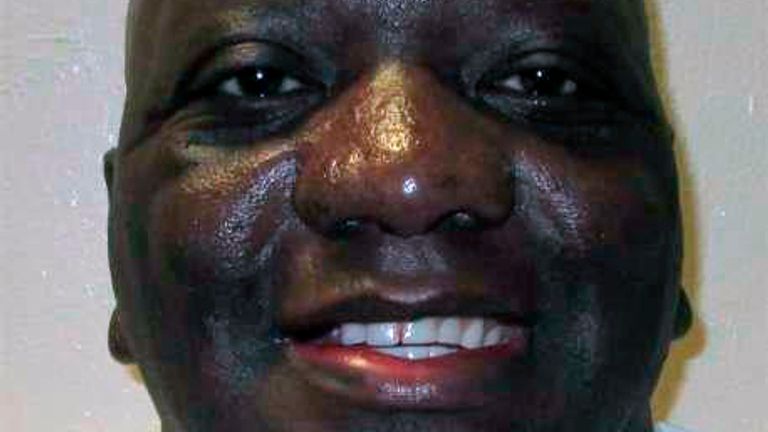A death row inmate has won a reprieve from a scheduled lethal injection after the US Supreme Court ruled it could not go ahead without his pastor in the chamber.
Willie B Smith III was due to be executed on Thursday but it was called off by Alabama officials after the justices maintained an injunction issued by the 11th US Circuit Court of Appeals.
Department of Corrections spokeswoman Samantha Rose said the execution would not proceed given the ruling.
Alabama has argued that non-prison staff should not be in the room for security reasons.
"Willie Smith is sentenced to death, and his last wish is to have his pastor with him as he dies," Justice Elena Kagan wrote in an opinion joined by three other justices.
They included Donald Trump's controversial late appointee to the Supreme Court, Amy Coney Barrett, which saw her break from the bench's most right-wing faction on the religious freedom case.
"Alabama has not carried its burden of showing that the exclusion of all clergy members from the execution chamber is necessary to ensure prison security," Justice Kagan wrote.
"So the State cannot now execute Smith without his pastor present, to ease what Smith calls the 'transition between the worlds of the living and the dead'."
The case was the latest in a series of legal battles over personal spiritual advisers at executions.
In 2019, the court halted the execution of a Texas inmate who claimed his religious freedom would be violated if his Buddhist spiritual adviser was not allowed to be in the death chamber with him.
Justice Brett Kavanaugh suggested in a dissent against the ruling that states that want to avoid litigation on the issue "should figure out a way to allow spiritual advisors into the execution room, as other states and the federal government have done".
Justices Samuel Alito and Neil Gorsuch did not disclose how they voted, but both would have needed to side with Justice Kavanaugh, John Roberts, and Clarence Thomas for the execution to proceed.
If the execution had gone ahead it would have been the first by a state in 2021 and one of the few at the state level since the start of the pandemic last year.
While a number of federal death row inmates were put to death in the final months of he Trump administration, the Death Penalty Information Centre says no state has had an execution since last July.
Following the latest Supreme Court ruling, Smith was taken from a holding cell near the execution chamber and returned to his cell on death row, a prison spokeswoman said.
"The state is currently reviewing its options in light of last night's Supreme Court order leaving the 11th Circuit Court of Appeals' preliminary injunction in effect," Mike Lewis, a spokesman for Attorney General Steve Marshall, said.
Smith had sought to allow his spiritual adviser, Pastor Robert Wiley, in the execution chamber.
"Mr Smith pled that he believes that the point of transition between life and death is important, and that having his spiritual advisor physically present at that moment is integral to his faith," Smith's lawyers wrote in court documents.
Robert Dunham, executive director of the Death Penalty Information Centre, said the Supreme Court has not ruled whether states are constitutionally required to permit a spiritual advisor in the execution chamber.
But, he added that states "can make this issue disappear simply by permitting a religious advisor to be present".
"If they don't, it will continue to be an issue until the Supreme Court rules on the substance of one of these claims, rather than issuing shadow-docket rulings to grant or vacate stays of execution or preliminary injunctions," Mr Dunham said.
In the past, Alabama routinely put a Christian prison chaplain employed by the state in the execution chamber to pray with an inmate if requested.
But the state stopped that practice after a Muslim inmate asked to have an imam present.
The prison system, which did not have Muslim cleric on staff, said non-prison staff would not be allowed in the chamber.
A jury convicted Smith in 1992 of killing Sharma Ruth Johnson, who was the sister of a Birmingham police detective.
Prosecutors said Smith abducted Johnson at gunpoint from a cashpoint, stole $80 from her and then took her to a cemetery where he shot her in the back of the head.
Justices vacated another stay issued by the 11th Circuit related to Smith's intellectual capacity after his lawyers argued the state failed to give the man - who has an IQ below 75 - required assistance with forms affecting the timing of his execution.



